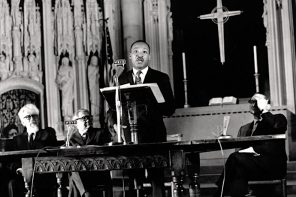Many progressives have compared and contrasted the contemporary fight for same-sex marriage with the black freedom struggle. The shared quests for equal justice under the law and civil rights protections have been affirmed, even as others of us question the political expediency of direct correlations and uncritical appropriations.
Calls for historical and contextual specificity, however, should not trump coalition building. While it may be too glib to declare gay the new black, we must acknowledge that to be gay and/or a person of color is to be queer in the American cultural context. Over at Killing the Buddha, informed by the indomitable courage of civil rights icon Bayard Rustin, the Rev. Osagyefo Uhuru Sekou makes this case with analytic sophistication and intellectual precision.
Rustin, who himself lived under the double-jeopardy of being black and gay in America, maps the route for us “From Montgomery to Stonewall.” Having to resist biblically-sanctioned and culturally condoned violence against one’s humanity is the tie that binds. And Rev. Sekou argues that living in a contemporary condition of existential uncertainty, denied opportunity and deferred democracy is why the gay rights movement understandably looks to the black freedom struggle as an example of how to resist the niggerization process in America.
Cornel West contends that being niggerized should not be reduced to the dehumanization, economic exploitation, and political disenfranchisement of black people. He unracializes the term insofar as it becomes a much broader category to describe the bastardizing and impeding of democracy. Turning citizens into “intimidated, fearful and helpless subjects,” according to West, is what it means to be a Nigger.
For this reason, Rev. Sekou argues convincingly that while Gay may not be the new black, with the passing of Prop 8 and other state constitutional amendments proscribing the lives and liberties of our gay brothers and sisters, “Gays Are the New Niggers!”




